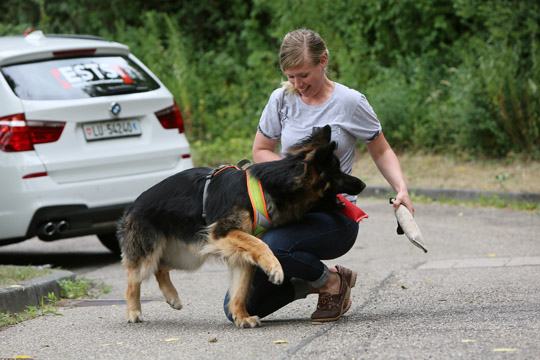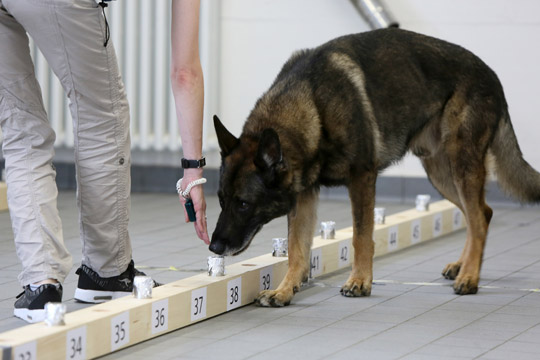Find it, find it!
Freiburg, Sep 08, 2017
Why would you have a sniffer dog at a football stadium? Maybe it's nosing around the fans and hunting for fireworks. Emotionally-charged derbies especially are often seen as high-risk games, so organizers like to have intensive checks. But is it a good idea to use dogs in such volatile situations? For instance, how do football fans such as ultras respond to the animals? How successful are the dogs at detecting explosives? And what special care should the dog handlers take at work?
 Achieving uniform standards: Martina Biebert hopes her results will be incorporated in the training of dog handlers.
Achieving uniform standards: Martina Biebert hopes her results will be incorporated in the training of dog handlers.
Photo: Christoph Breithaupt
Cultural anthropologist Martina Biebert is interested in questions like this. She works at the Centre for Security and Society of the University of Freiburg on the EVADEX project, which aims to assess the many systems for detective explosive materials – in every area except the already strictly regulated aviation safety. Together with André Biermann, Biebert is responsible for 'ancillary sociological research': her colleague looks at technical resources, she looks at sniffer dogs.
Human and dog are a team
One of Biebert's jobs is to determine the factors contributing to acceptance: what is the effect of the dogs on the people that they are supposed to be controlling? "Technical research has shown that use of certain methods can also have unintended consequences." For instance, use of the body scanner is effective, but it has given rise to resistance – many people feel it is a massive intrusion into their personal privacy.
"A dog appears to intrude on people's privacy less," says Biebert. Whilst each deployment must be considered on its own, on the whole she draws a positive conclusion, "The dog is a very well-established tactical tool for deployments." This is not just a result of the tradition of the police dog in Germany that stretches back more than one hundred years, but also of the thousand years of shared history of humankind and dogs. Both mammals once lived together in a kind of symbiosis, "The dog cleaned up waste, kept the herd together, warned of danger and in return was taken care of by humans."
 Dogs can perceive even the smallest traces of scent – but we still don't know how they do it.
Dogs can perceive even the smallest traces of scent – but we still don't know how they do it.
Photo: Christoph Breithaupt
Biebert has held numerous interviews: with police dog handlers and industry safety managers, with team leaders and private security services, with ultras and with those responsible for the fans. She has accompanied a dog handler and his German Shepherd dog on patrol outside an exhibition hall before an AGM, and she has observed the Bundesliga game between Werder Bremen and the Hamburger Sportverein. Whilst irritated fans are entirely capable of kicking a screening machine apart, ultras told her that they tended to feel sorry for the dogs because they assumed the situation was stressful for them.
Great need for standardization
On the other hand Biebert detected a certain skepticism amongst team leaders and security managers about the use of sniffer dogs: they generally felt that technical tools were more reliable or predictable – which Biebert puts down partly to the individual relationship between dog handler and dog but also to the lack of uniform standards.
The project also aims to contribute to developing such standards. Fear of terrorist attacks has massively increased the demand for explosives sniffer dogs at major events. Biebert hopes that her results will be incorporated in the Deutsche Institut für Normung's revised standards for security service providers, "The demand is there – and there is loads of potential for standardization." For example, fear or disgust reactions during checks can be reduced if certain breeds and muzzles are used; also, operational processes could be more standardized, as could training and testing the dogs.
In addition, the project team is undertaking fundamental research into dogs' sense of smell, "We know that they can perceive traces of scent down to absurdly small levels – but we don't know exactly how they do it," says Biebert. In experiments with a cooperating Swiss dog team, Biebert and the scientists at the Fraunhofer-Institut für Chemische Technologie in Pfinztal near Karlsruhe are investigating what exactly happens when a sniffer dog is on an operation. The joint work is amazing, says the cultural anthropologist, "The dog is a multidisciplinary object of study."
Thomas Goebel

